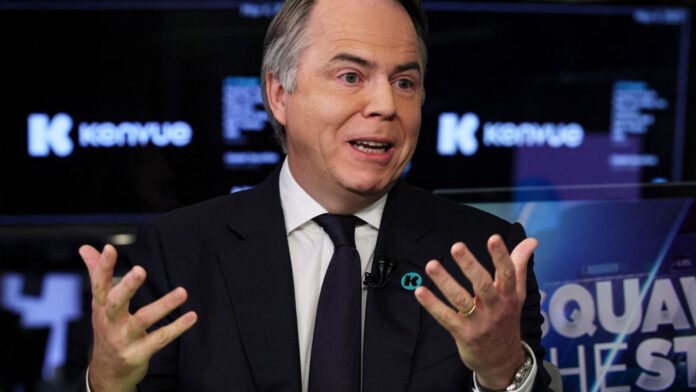
Consumers Maintain Loyalty to Trusted Brands Amid Inflation: Insights from Kenvue CEO Thibaut Mongon
Consumers spend on health products as they pull back elsewhere
As inflation continues to impact consumer spending, one company has observed a unique trend in the market.
Thibaut Mongon, the CEO of Kenvue Inc., a consumer-health business spun off from Johnson & Johnson, revealed that consumers are still willing to invest in brand-name health and personal care products.
Despite reducing discretionary spending and seeking lower-priced alternatives for some essential items, consumers remain loyal to Kenvue’s widely known brands such as Band-Aid, Tylenol, Listerine, Neutrogena, and Aveeno.
This article will delve into Kenvue’s success amid challenging economic times and explore how other beauty and beverage companies might also benefit from consumer loyalty to trusted brands.
1. Resilience of Kenvue’s Branded Products
Kenvue, the consumer spinoff of Johnson & Johnson, outperformed second-quarter revenue and earnings estimates, driven by the unwavering demand for its well-established brands. Consumers continue to invest in Kenvue’s products despite economic uncertainties and persistent inflation.
The company’s portfolio of trusted, science-backed, and efficacious solutions has earned lifelong loyalty from generations of consumers, contributing to its resilience in the market.
2. The Impact of Private Label Penetration
While private label products aim to compete with branded products at lower prices, Kenvue noted that the “private label” penetration in the consumer health product market remained stable during the quarter. Consumers’ loyalty to Kenvue’s brands, backed by recommendations from healthcare professionals, provides a level of protection against potential trade-downs and private-label competition.
3. Consumer Trust in Challenging Times
The Covid-19 pandemic significantly elevated consumers’ attachment to brands that helped them take care of their health and well-being. This heightened focus on health and well-being has further boosted demand for Kenvue’s products, which have been fixtures in households for years, if not decades. During challenging economic times, consumers tend to turn to brands they know and trust, which bodes well for companies like Kenvue.
4. Beauty Products as Affordable Luxury
The beauty category, including makeup, has shown resilience despite macroeconomic uncertainties and inflation. Beauty products are increasingly viewed as “affordable luxuries,” and consumers are willing to invest in trusted brands to maintain their self-care routines. Companies like Ulta, with its diverse range of beauty products, have experienced considerable success and record revenues during these challenging times.
5. Beverage Companies’ Advantage
Beverage companies, particularly those with strong brand names like Coca-Cola, have an advantage in the current market. Big brand names have a lower exposure to private label penetration, making them less susceptible to trade-downs. Price hikes on products, implemented to mitigate the impact of inflation, have also helped fuel positive results for companies like Coca-Cola.
6. Looking Ahead: Forecasts and Market Opportunities
Kenvue anticipates strong demand to continue in the coming quarters, projecting a sales increase between 4.5% and 5.5% from the previous year. Analysts, including RBC Capital’s Nik Modi, express confidence in Kenvue’s ability to maintain momentum, driven by consumer trust in its brands and health and personal care products. This positive outlook might extend to other companies in the consumer health, beauty, and beverage spaces that prioritize consumer trust and well-being.
Conclusion
In a time of inflation and economic uncertainty, consumer loyalty to trusted brands remains a vital driver of success for companies like Kenvue. The unwavering demand for branded health and personal care products defies trade-down trends, providing a ray of hope for the consumer health, beauty, and beverage industries. As consumers prioritize their health and well-being, companies with science-backed and trusted solutions are poised to thrive in the face of ongoing challenges.
FAQs
- What brands are part of Kenvue’s portfolio?Kenvue’s portfolio includes widely known brands such as Band-Aid, Tylenol, Listerine, Neutrogena, and Aveeno.
- How has the Covid-19 pandemic affected consumer behavior?The pandemic significantly elevated consumer attachment to brands that helped them take care of their health. Consumers tend to trust these brands during challenging times, contributing to their resilience despite macro pressures.
- What market opportunities exist for beverage companies like Coca-Cola?Beverage companies with strong brand names like Coca-Cola have an advantage in the current market, as they are less exposed to private label penetration. Price hikes on products have also contributed to positive results for these companies.
- What makes the beauty category resilient amid inflation?Beauty products, including makeup, are increasingly seen as “affordable luxuries.” Consumers are willing to invest in trusted brands to maintain their self-care routines, leading to success for companies like Ulta.
- How does Kenvue maintain its market share amid competition and trade-down pressures?Kenvue’s strong market share is attributed to consumer trust in its brands and product recommendations from healthcare professionals, providing some protection against trade-downs and private-label competition.


















